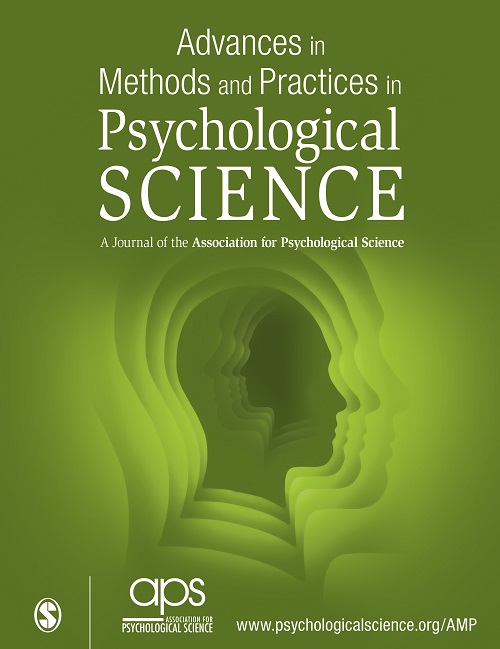Selective Hypothesis Reporting in Psychology: Comparing Preregistrations and Corresponding Publications
IF 13.4
1区 心理学
Q1 PSYCHOLOGY
Advances in Methods and Practices in Psychological Science
Pub Date : 2023-07-01
DOI:10.1177/25152459231187988
引用次数: 3
Abstract
In this study, we assessed the extent of selective hypothesis reporting in psychological research by comparing the hypotheses found in a set of 459 preregistrations with the hypotheses found in the corresponding articles. We found that more than half of the preregistered studies we assessed contained omitted hypotheses ( N = 224; 52%) or added hypotheses ( N = 227; 57%), and about one-fifth of studies contained hypotheses with a direction change ( N = 79; 18%). We found only a small number of studies with hypotheses that were demoted from primary to secondary importance ( N = 2; 1%) and no studies with hypotheses that were promoted from secondary to primary importance. In all, 60% of studies included at least one hypothesis in one or more of these categories, indicating a substantial bias in presenting and selecting hypotheses by researchers and/or reviewers/editors. Contrary to our expectations, we did not find sufficient evidence that added hypotheses and changed hypotheses were more likely to be statistically significant than nonselectively reported hypotheses. For the other types of selective hypothesis reporting, we likely did not have sufficient statistical power to test for a relationship with statistical significance. Finally, we found that replication studies were less likely to include selectively reported hypotheses than original studies. In all, selective hypothesis reporting is problematically common in psychological research. We urge researchers, reviewers, and editors to ensure that hypotheses outlined in preregistrations are clearly formulated and accurately presented in the corresponding articles.心理学中的选择性假设报告:比较预登记和相应的出版物
在这项研究中,我们通过比较在一组459个预登记中发现的假设与在相应文章中发现的假设,评估了选择性假设报告在心理学研究中的程度。我们发现,在我们评估的预登记研究中,超过一半的研究包含省略的假设(N = 224;52%)或添加假设(N = 227;57%),约五分之一的研究包含方向变化的假设(N = 79;18%)。我们发现只有少数研究的假设被从主要重要性降为次要重要性(N = 2;1%),没有研究的假设从次要重要性提升到首要重要性。总的来说,60%的研究至少包含一个假设在这些类别中的一个或多个,这表明研究人员和/或审稿人/编辑在提出和选择假设方面存在重大偏见。与我们的预期相反,我们没有发现足够的证据表明增加假设和改变假设比非选择性报告的假设更有可能具有统计显著性。对于其他类型的选择性假设报告,我们可能没有足够的统计能力来检验与统计显著性的关系。最后,我们发现重复性研究比原始研究更不可能包含选择性报告的假设。总之,选择性假设报告在心理学研究中普遍存在问题。我们敦促研究人员、审稿人和编辑确保在预注册中概述的假设在相应的文章中得到清晰的表述和准确的呈现。
本文章由计算机程序翻译,如有差异,请以英文原文为准。
求助全文
约1分钟内获得全文
求助全文
来源期刊
CiteScore
21.20
自引率
0.70%
发文量
16
期刊介绍:
In 2021, Advances in Methods and Practices in Psychological Science will undergo a transition to become an open access journal. This journal focuses on publishing innovative developments in research methods, practices, and conduct within the field of psychological science. It embraces a wide range of areas and topics and encourages the integration of methodological and analytical questions.
The aim of AMPPS is to bring the latest methodological advances to researchers from various disciplines, even those who are not methodological experts. Therefore, the journal seeks submissions that are accessible to readers with different research interests and that represent the diverse research trends within the field of psychological science.
The types of content that AMPPS welcomes include articles that communicate advancements in methods, practices, and metascience, as well as empirical scientific best practices. Additionally, tutorials, commentaries, and simulation studies on new techniques and research tools are encouraged. The journal also aims to publish papers that bring advances from specialized subfields to a broader audience. Lastly, AMPPS accepts Registered Replication Reports, which focus on replicating important findings from previously published studies.
Overall, the transition of Advances in Methods and Practices in Psychological Science to an open access journal aims to increase accessibility and promote the dissemination of new developments in research methods and practices within the field of psychological science.

 求助内容:
求助内容: 应助结果提醒方式:
应助结果提醒方式:


